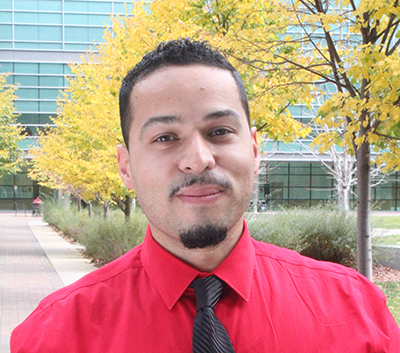
Triple Your Impact This Holiday Season
Triple Your Impact This Holiday Season
Celebrate the holidays with a year-end gift that can go 3x as far to help provide care and support to the millions affected by Alzheimer's disease, and to advance critical research. But please hurry — this 3x Match Challenge ends soon.
Donate NowBilingual Researcher Provides Alzheimer’s Education in Hispanic/Latino Community
Trained in neuropsychological assessment of the Spanish-speaking population, Luis Medina, Ph.D., is a 2019 grant recipient of the Alzheimer’s Association Research Fellowship to Promote Diversity (AARG-D). Dr. Medina currently directs the Collaborative on Aging Research and Multicultural Assessment (CARMA) at the University of Houston.
Professional Passion Becomes Personal Purpose
 Dr. Medina was born in Caguas, Puerto Rico, moving from the island to New York City and later to Connecticut. A proud first generation college student and doctoral student who studied in San Diego, Los Angeles and Denver, Medina began his research working with older adults at the UCLA Department of Neurology. “There I was exposed to autosomal-dominant Alzheimer’s disease in a Mexican family, learning about this rare early-onset familial Alzheimer’s disease,” Medina said. “These relationships and types of experiences are an integral part of why I do what I do.”
Dr. Medina was born in Caguas, Puerto Rico, moving from the island to New York City and later to Connecticut. A proud first generation college student and doctoral student who studied in San Diego, Los Angeles and Denver, Medina began his research working with older adults at the UCLA Department of Neurology. “There I was exposed to autosomal-dominant Alzheimer’s disease in a Mexican family, learning about this rare early-onset familial Alzheimer’s disease,” Medina said. “These relationships and types of experiences are an integral part of why I do what I do.”
Dr. Medina’s research addresses how race, ethnicity and other cultural factors are related to cognitive effects of aging and dementia. “My work has been evolving over the years as I attempt to highlight how diagnosis of Alzheimer’s and dementia in diverse populations can be improved. It is widely-known in my field that a lot of cognitive tests aren’t as effective when considering culturally diverse people; these tests were simply not developed for these populations.” Medina said. “I’ve seen health disparities firsthand: how psychology and assessment tools look different in different populations. I strive to increase our ability to better diagnose Alzheimer’s and dementia by improving current methods.” Dr. Medina’s work also focuses on improving clinical trial recruitment and retention in diverse populations.
Medina was touched by Alzheimer’s on a very personal level when his own grandmother developed the disease. “It was a tough reality, facing the personal aspects of the disease after having studied it and researched it. As I said my final goodbye to her, she said: “I love you.” My aunt was sitting next to her. “Do you know who you said that to?” my aunt asked her. She said “No”, she didn’t … “but I know that I love him very much.” That was all I needed to show me that she was still there on an emotional level.” Medina’s grandmother passed away in 2012.
Given his background, upbringing and personal experience with the disease, Luis understands the values of the Hispanic/Latino population when it comes to caregiving. “The community has a very family-centered approach to caring for their loved ones, an almost unspoken expectation that family is going to be taking care of each other no matter the circumstance. The truth is that this leads to caregiver burden and stress that goes largely untreated; some of these people don’t even consider themselves caregivers as they are doing it for their family.”
Latinos have a 50 percent greater chance of developing Alzheimer’s and related dementias than Caucasians, and these diseases also develop at an earlier stage. “Increasing education to these communities, we will eventually get people better care and hopefully have a better understanding of what contributes to resistance and resilience in Alzheimer’s disease.”
Ultimately, Dr. Medina focuses on how his work is making a difference for families, caregivers and future generations. “I aim not just to treat these populations, but to understand them better. Health literacy is key. Many people still have a limited understanding of what Alzheimer’s and dementia even are. Education and support are out there, and organizations like the Alzheimer’s Association help people get connected and better informed about ways they can love their brain. When I talk to communities about research that is happening, and the non-invasive clinical trials that are available, people are interested. I encourage no one to be afraid, because educating yourself on this disease will be worth your time, whether it helps you or someone else.”
Related articles:
Research
Causes and Risk Factors
